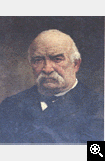|
|
|
| |
| |
Domenico Berti
| |
 |
|
was born in Cumiana (Turin) on 17th December 1820. After studying with Giovanni Antonio Rayneri and Ferrante Aporti, Berti graduated in Literature and Philosophy at the University of Turin.
He precociously looked after pedagogic problems of the school reformation. With a Catholic education, Berti made his first political experiences in the Piedmont of Carlo Alberto's reformations. Linked in a first time to democratic environments, he co-operated to magazines "Letture popolari" (Popular readings) and "Letture familiari" (family readings) and took side first with Gioberti and then with moderate liberals. After teaching Method at schools of Casale and Novara, Berti achieved the chair of Method applied to the elementary teachinng in the University of Turin.
In 1849 he got the chair of Moral Philosophy at the University of Turin. In 1872 Berti got the chair of History of Philosophy at the University of Rome, where, up to 1872, he was also director of the Faculty of Literature and Philosophy.
Berti's works were devoted to the Italian thought between Renaissance, Reform, and Counter-Reform, We can remember the works on Giordano Bruno (1858) and Copernico in Italy (1876).
Next to his academic activity, Berti played an important role in the field of organising the culture and the political life. Elected as a deputy in the Chamber up to 1850, Berti supported the liberal and conservative movement led by Cavour.
In 1862, during the first Rattazzi's government, Berti became general secretary of the Ministry of Agriculture and Trade. Then he became Minister of Public Education in the second La Marmora's government, between 1865 and 1867. In the period in which he led the Ministry of Public Education, Berti favoured a high growth in the primary and popular education to wrestle the analfabetism. He assigned a remarkable or even prime space to technical education. In all ways he favoured the creation and growth of schools of arts and jobs and generally the superior scientific technical education. To enforce these lines of reformation Berti tried also, in line with ideas expressed on statements of "The Polytechnic" by Cattaneo, to favour a high managing decentration, giving provinces the main powers in the field of school planning.
Noted the ideal and political crisis of the Right, Berti approached the Left of Depretis, in whose government he was Minister of Agriculture and Trade from 1881 to 1884. Advancer of the social legislation, Berti tried through an ambitious reformming plan, even if linked to a view still marked by paternalist and philantropic behaviours, to legalise the workers' association right, to organise some types of support, some forms of pensionistic aid, to fix civil responsibilities by entrepreneurs at level of accidents in work. However, these projects were not enforced due to the hostility of conservative environments next to Depretis, who suggested the Primer to leave proposals by the Minister fall. Elected in 1884 as a deputy president of the Chamber, Berti gradually started to depart from the active political life.
Since 1888 Berti became president of the Royal Italian Industrial Museum. He constantly used his prestige in favour of the Turinese body. Appointed in 1895 as a prime secreatary of the Order of SS. Mauritius and Lazarus and chancellor of the Order of the Italian Crown, Berti became a senator of the Kingdom in 1895. He died in Rome on 22nd April 1897.
|
| |
|
|

